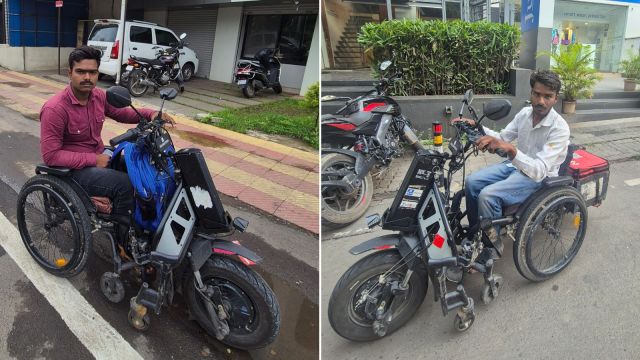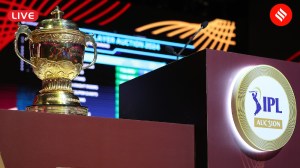Click here to join Express Pune WhatsApp channel and get a curated list of our stories
Against All Odds | When I request them to come downstairs, they refuse or cancel: How delivery partners with disabilities navigate customer behaviour
Wheelchair users Ravindra Bhitade and Sachin Godage say that working as delivery partners in Pune allows them greater flexibility and a good income but not all customers are supportive.
 Ravindra Bhitade and Sachin Godage live at the Zunj Divyang Sanstha in Ravet. (Express Photo)
Ravindra Bhitade and Sachin Godage live at the Zunj Divyang Sanstha in Ravet. (Express Photo)On the busy streets of Pune, where food delivery bikes zip through traffic every day, some delivery partners with disabilities are making their mark in an inspiring way and have turned what many might see as challenges into opportunities for financial independence.
Wheelchair users Ravindra Bhitade and Sachin Godage come from farming families in Solapur, where life was tough due to financial constraints and limited job opportunities. Like many young people from rural areas, they faced the difficult choice of staying back with uncertain prospects and decided to move to Pune to chase their dreams.
They live at the Zunj Divyang Sanstha in Ravet. Bhitade, 19, who hails from Karmala, is currently pursuing a nursing course at Chinchwad’s Morya Hospital while working part-time as a delivery partner to cover his expenses. “This is the best option for me to earn while having flexible working hours. I can maintain a good balance between my studies and work, which would not be possible with a regular job,” he says. Once he completes his nursing course, Bhitade plans to specialise further in healthcare.
Before joining the food delivery service, Godage, 21, worked at a tea stall where the pay was very low, and he did not feel respected. “The salary was barely enough, and I was also facing an identity crisis. Zomato has solved both these problems for me. Now I’m even planning to settle permanently in Pune,” he says.
“I can take breaks or holidays whenever I want, which is rarely possible in other jobs. This flexibility has offered me the time to learn an electronics vocational course,” he adds. While both young men find merit in their work, they also face unique challenges.
“I cannot walk without help, but some customers still ask me to deliver orders to high floors in buildings. They get a notification that their delivery partner has special needs, but they don’t always understand,” says Bhitade.
“Customers are very supportive and appreciate our hard work, but some don’t show understanding. When I request them to come downstairs, they refuse or cancel the order instead, which feels disrespectful. We’re not doing this on purpose; we just need a little consideration,” he points out.
Godage, however, also faces technical issues. “My electric vehicle takes four hours to fully charge, but I can only drive for 2.5 hours before it needs charging again. So I have to keep stopping to charge it throughout the day. If technology improves and battery life increases, I could deliver many more orders.”
“Last Sunday, while delivering an order near Chaphekar Chowk in Chinchwad, my phone got completely wet in the heavy rain. I couldn’t complete the delivery. My ID got deactivated immediately, and I lost some daily earnings because I was unable to inform my team leader about the problem,” Godage says.
Speaking to The Indian Express, Sudhir Jaykumar, Team Leader from Hinjewadi, says, “Our regular base rate is around Rs 25 per delivery, but specially abled delivery partners get three times this amount, around Rs 75 per delivery. Also, there’s a government-backed scheme where we collaborate to provide electric vehicles, or partners can buy their own if they prefer.”
“Our goal is to promote inclusivity and provide a flexible income source. Delivery partners who work consistently can earn Rs 30,000 to 40,000 per month, depending on how many deliveries they complete,” Jaykumar states.
Regarding Godage’s ordeal, Jaykumar says, “We only deactivate IDs when someone deliberately violates our rules. In cases like undelivered orders due to technical problems, partners should inform us through the live support app. We reactivate IDs immediately and even reimburse unfair penalties.”
Zomato’s Project ZEAL (Zomato’s Equitable Action for Livelihood) was launched in December 2022. The programme waives onboarding fees for delivery partners with disabilities and assigns shorter delivery distances to accommodate their mobility needs, while also including special notifications to customers and restaurants to raise awareness and promote inclusivity. So far, Zomato has onboarded over 400 individuals with locomotor disabilities as delivery partners, primarily wheelchair users.
While Swiggy does not have a specific programme for delivery partners with disabilities, they provide “an inclusive environment for partners including those with physical disabilities.” In 2022, a video of a Swiggy delivery partner riding a wheelchair scooter went viral on social media, earning praise from thousands of people online. The video was shared by the then Delhi Commission for Women chief Swati Maliwal and inspired many to appreciate the hard work of delivery partners across different platforms.
Shubham Kurale is an intern with The Indian Express.
Click here to join Express Pune WhatsApp channel and get a curated list of our stories






